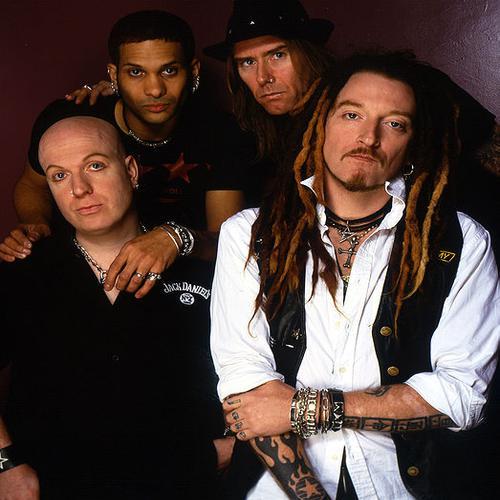
The Wildhearts
by Ed RivadaviaThe Wildhearts were the kind of band that the British rock press has wet dreams about: creatively brilliant, completely out-of-control, and utterly doomed from day one. Led by charismatic lunatic Ginger, the group's turbulent career lived up to the highest (or lowest, as it were) expectations, with all the ups and downs of a roller-coaster ride, which, after numerous frightening twists and turns, finally derailed in spectacular fashion. But not before yielding a wealth of inspired hard rock and literally miles of even more entertaining magazine copy.\r A long-time denizen of London's sleazy underground glam rock scene, vocalist/guitarist Ginger was coming off a brief stint with Faces wannabes the London Quireboys (he was kicked out for doing too many drugs -- imagine that) and an even shorter turn with New York-based glam disasters the Throbs when he decided to start his own group, the Wildhearts, in early 1990. Joining him were ex-Tattooed Love Boys guitarist Chris "C.J." Jagdhar, drummer Andrew "Stidi" Stidolph, singer Snake, and one Julian on bass; but this setup wouldn't last long (a sign of things to come) and by the following year, Ginger had sacked everyone but Jagdhar and assumed vocal duties himself. After borrowing drummer Bam from the Dogs D'Amour and recruiting 19-year-old bassist Danny McCormack, the group became an instant sensation in London clubs. Their unashamedly decadent image and ultra-heavy hard rock quickly ignited the English press' hype machine and, after flirting with Atco, they signed a contract with EastWest Records in the summer of 1991. \r Besides wetting their feet in the recording studio with a couple of EPs (Mondo Akimbo A-Go-Go and Don't Be Happy...Just Worry), the Wildhearts continued to tour incessantly throughout 1992, logging an especially memorable trek with on-the-rise glam-political rockers the Manic Street Preachers. Come the new year, Bam resumed his post with the Dogs D'Amour, making way for the return of original drummer Stidi, who performed on the band's full-length debut Earth Vs. the Wildhearts, released in September 1993. Though it achieved reasonable success across Europe and the U.K. (climbing to number 46 on the national charts), the album received little promotional support in America, and Ginger soon began butting heads with EastWest and seemingly taking it out on his bandmates. Stidi was the first casualty, replaced in October by former Radio Moscow drummer Ritch Battersby, who promptly joined the band on tour. Criss-crossing the U.K. with other British hopefuls like the Almighty and Wolfsbane, the Wildhearts set new standards for rude behavior and substance abuse, but rarely failed to impress with their over-the-top stage antics and impossible-to-contain intensity. \r Despite their growing momentum, however, 1994 was to be a troubled year for the group; the first of many, actually. In July, "blood-brother" C.J. Jagdhar was somehow fired during one of Ginger's wild mood swings (a decision he later claimed to deeply regret) and the band's future continually hung in the balance. Guitarist Devin Townsend (Steve Vai, later Strapping Young Lad) and keyboard player Willie Downing (from the Grip, later Honeycrack with Jagdhar) joined temporarily, performing with the Wildhearts at the Reading Festival, where bassist Danny McCormack also managed to dislocate his knee during the very first song but soldiered through to the end of the set. Then to close out the year, Ginger and McCormack paid a destructive visit to the headquarters of Kerrang! magazine, where they proceeded to trash office equipment and generally raise hell in a brilliant publicity stunt geared to promote a fan-club-only release called Fishing for Luckies. \r Whether legitimate or fabricated by the press, chaos and controversy continued to dog the Wildhearts' every step in the ensuing months, leading up to the long-overdue release of their sophomore effort in May 1995. Miraculously, in spite of all the madness which had reigned during its creation -- including the use of two separate producers, and a supposed suicide attempt by Ginger whilst mastering the disc in New York -- the aptly named P.H.U.Q. album was arguably the Wildhearts' finest hour, entering the British charts at number six and finding great favor with fans and media alike. The euphoria would be short-lived, however, as it too went largely ignored outside the U.K., Europe, and Japan, and was never even released in America. Adding to this on-going soap opera, recently added new guitarist Mark Keds (former Senseless Things) was with the band for a less than a month before going A.W.O.L. in the middle of a Japanese tour and forcing them to cancel numerous U.K. appearances upon their return, not least of which, a would-be lucrative slot in the Phoenix Festival. \r New guitarist Jef Stretfield came on-board in October 1995, but the increasingly unstable Ginger continued his very public spiral out of control, squabbling with EastWest and threatening to split up the Wildhearts unless they were released from their contract. A nervous truce was finally struck when the band was offered the opening slot on AC/DC's 1996 tour of Europe; but plans to carry on with the second leg in America were squashed at the last minute when the label's U.S. division pulled their tour support. This proved to be the last straw, and they were finally dropped by EastWest, which re-released Fishing for Luckies later that year, along with a Best of the Wildhearts collection. The band stubbornly carried on, releasing two independent singles before signing with tiny Mushroom Records and issuing 1997's Endless, Nameless (a strange experiment in white noise which made them no friends). The band quickly disintegrated a short time later, and another collection of B-sides and leftovers entitled Landmines & Pantomines seemed to close the book on the Wildhearts' career. But, though he tried to start from scratch a few years later with new group Silver Ginger 5, Ginger eventually reunited the "classic" Wildhearts lineup once again in early 2001; the reassembled band even released an album in the United States, Riff After Riff, in 2004.\r
